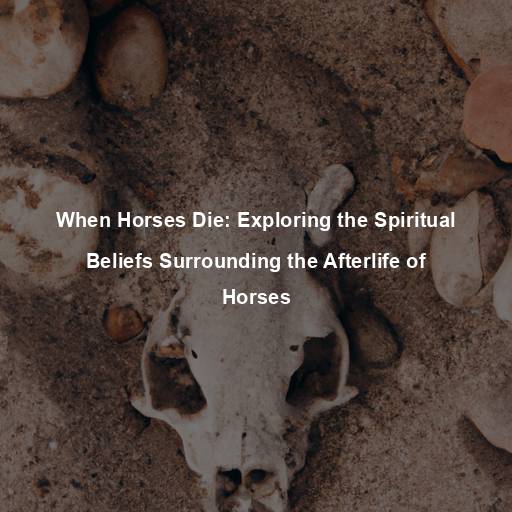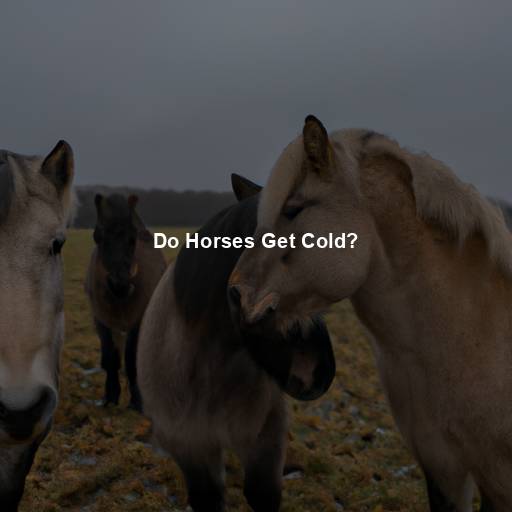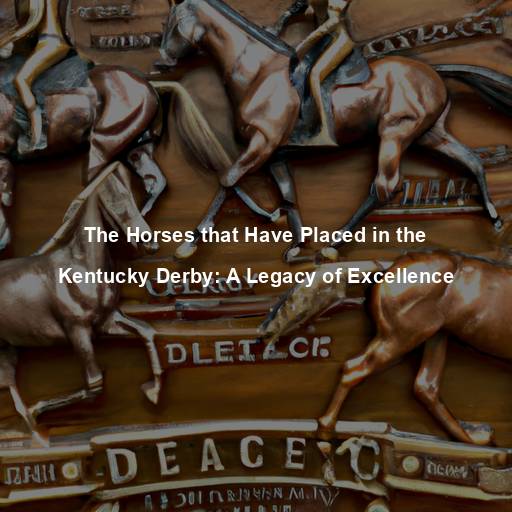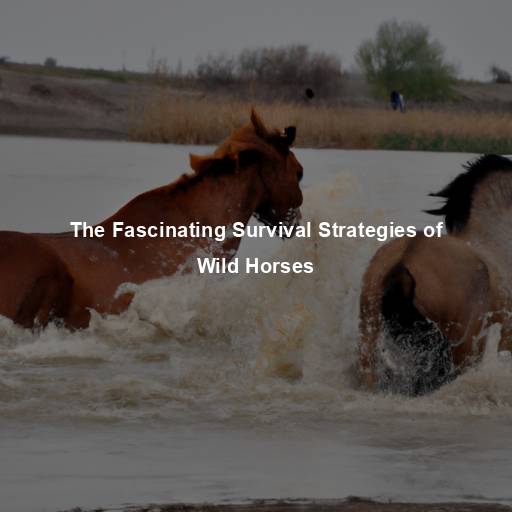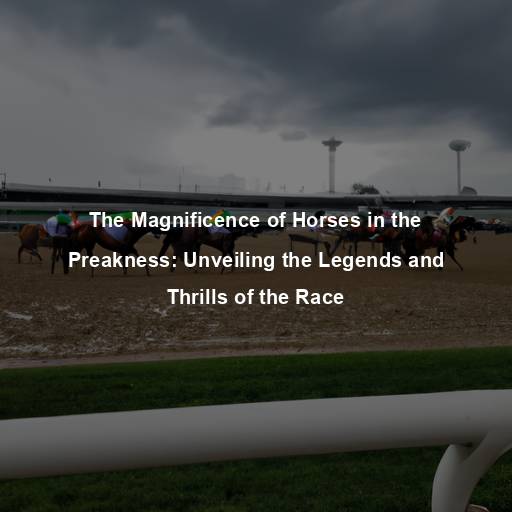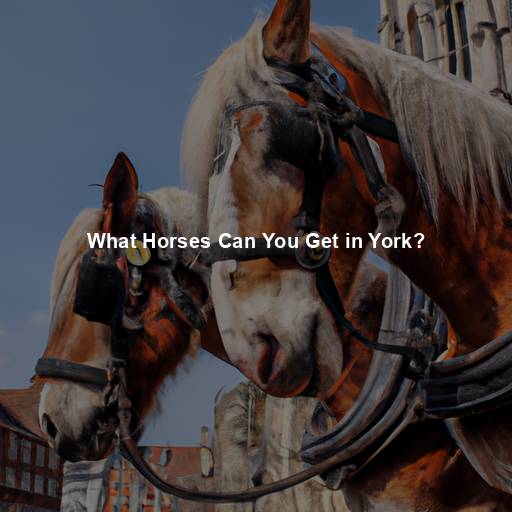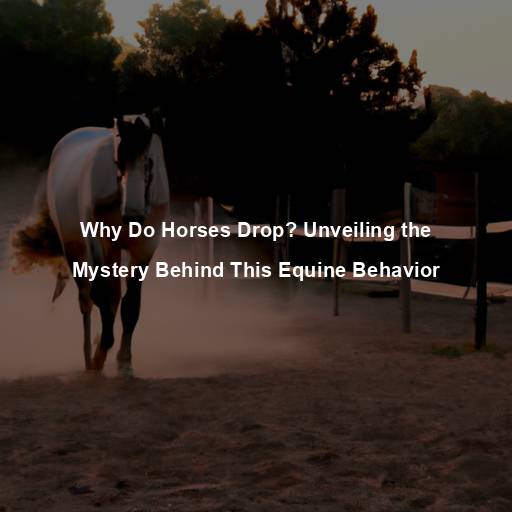When Horses Die: Exploring the Spiritual Beliefs Surrounding the Afterlife of Horses
Last Updated on July 21, 2023 by Evan
Contents [hide]
- 1 Understanding the Bond Between Humans and Horses
- 1.1 The Role of Horses in Human History
- 1.2 Different Cultural Beliefs
- 1.3 The Power of Symbolism
- 1.4 Coping with Loss
- 1.5 The Cycle of Life and Death
- 1.6 The Legacy of Horses
- 1.7 Memorializing Horses
- 1.8 Equine Burial and Cremation
- 1.9 Healing and Moving Forward
- 1.10 The Importance of Education and Advocacy
- 1.11 Embracing the Mystery
- 1.12 Grief and Loss
- 1.13 The Mourning Process
- 1.14 Finding Support
- 1.15 Honoring the Horse’s Memory
- 1.16 Keeping the Legacy Alive
- 1.17 Continuing the Connection
- 1.18 Supporting Equine Causes
- 1.19 Embracing the Memories
- 2 FAQs: When Horses Die, Where Do They Go?
- 2.1 What happens to horses when they die?
- 2.2 Can horses be buried after they die?
- 2.3 What is the process of horse cremation?
- 2.4 What is rendering and how is it done with horses?
- 2.5 Are there any guidelines or regulations to follow when a horse dies?
- 2.6 Can a horse owner keep the remains of their deceased horse?
- 2.7 What are some alternatives to traditional horse disposal methods?
- 2.8 Is it possible to euthanize a horse at home?
- 2.9 Are there any specific rituals or ceremonies associated with horse burials?
Understanding the Bond Between Humans and Horses
Throughout history, horses have been indispensable to our lives, lending their strength, beauty, and unwavering loyalty to our human journey. However, as we contemplate the delicate transition of these magnificent creatures from this world to the next, a cloud of uncertainty and intrigue fills the air. What becomes of these beloved beings? Do they traverse a mystical realm beyond our understanding or fade away into oblivion?
The Role of Horses in Human History
Step into a realm where horses transcend the boundaries of mortality, where their legendary tales unfold in the annals of history. To truly comprehend their ethereal existence, it is paramount to embark on a journey through the ages, witnessing the unprecedented influence these magnificent creatures have wielded upon our civilization. From the fertile fields of agriculture to the thunderous echoes of warfare, horses have seamlessly intertwined with our collective narrative, unearthing realms of exploration, enabling swift communication, and igniting passion in the arena of sport. It is through their indomitable strength, breathtaking speed, and effortless grace that horses have enraptured the human psyche, forever engraving an unbreakable bond between our species.
Different Cultural Beliefs
Across the diverse tapestry of global cultures, an enigmatic creature sparks the imagination and ignites the soul: the horse. Mysterious and revered, these majestic beings have long captivated civilizations far and wide. In a captivating journey through time and space, we shall unravel the intricate threads of belief that weave tales of equine afterlife. Brace yourself for a whirlwind adventure that will leave you spellbound, forever transformed by the manifold mysteries that surround these ethereal creatures.
Native American Beliefs
In the rich tapestry of Native American traditions, horses hold a captivating role intertwined with the spiritual realm. Across numerous tribes, these majestic creatures are regarded as bearers of profound significance, believed to harbor individual spirits of their own. As they gracefully traverse the realms of existence, it is believed that when their physical journey concludes, their spirits ascend to the sacred abode where revered beings reside. This enchanting connection between horses and the spiritual domain adds a captivating layer of depth to the intricate tapestry of Native American cultures.
Norse Mythology
In the mystical realms of Norse mythology, a tapestry of enchantment weaves tales of ethereal equines that transcend the ordinary bounds of existence. These majestic creatures, revered as bearers of fate, embark on an otherworldly odyssey, escorting valiant warriors across the threshold of mortality into the eternal embrace of the divine. The mystical bond between horse and rider, shrouded in enigma and bathed in the celestial glow, is said to endure the test of time, transcending the realm of the living into the enigmatic depths of the afterlife. As the strands of lore entwine, the wondrous journey unfolds, leaving both mortals and immortals awash in a symphony of awe and perplexity.
Hinduism and Buddhism
In Hinduism and Buddhism, the concept of reincarnation plays a significant role. According to these beliefs, all living beings, including horses, go through a cycle of birth, death, and rebirth. The actions and karma of a horse in its previous life determine its fate in the next. If a horse has led a virtuous life, it may be reborn in a higher form or attain liberation from the cycle of reincarnation.
Christian Perspectives
The intriguing question of whether animals have an afterlife has long captivated the minds of those who cling to religious beliefs. Within the fascinating tapestry of Christian faith, there exists a captivating spectrum of opinions on the eternal fate of our four-legged companions. While a fraction of denominations maintain that animals lack everlasting souls, thus ruling out the possibility of an afterlife, a compelling faction firmly believes that the benevolence of God transcends species boundaries, granting horses a coveted position in the heavenly realm. This contemplation serves as a testament to the wondrous intricacies and magnificence of God’s splendid creation.
The Power of Symbolism
Even if one does not adhere to specific spiritual beliefs, the symbolism surrounding horses can offer solace and comfort when they pass away. Horses often symbolize freedom, strength, and grace. Their presence in literature, art, and mythology evokes a sense of awe and wonder. When a horse dies, its symbolic power continues to resonate, reminding us of the enduring legacy they leave behind.
Coping with Loss
Losing a cherished horse is an emotional rollercoaster that leaves hearts shattered and souls bewildered. The void left by their absence is a perplexing abyss, where time stands still, and grief consumes us like an unavoidable tempest. Yet, amidst the anguish lies an opportunity for healing and growth. Embracing the power of shared experiences with fellow horse enthusiasts, engaging in heartfelt memorial activities, or crafting a personal tribute can serve as beacons of solace, leading us towards the path of restoration.
The Cycle of Life and Death
From a naturalistic perspective, the afterlife of horses can be understood through the lens of the circle of life. Just as all living beings are born, live, and eventually die, horses too follow this natural progression. When a horse passes away, its physical body returns to the earth, becoming part of the ecosystem once again. The nutrients and energy stored within the horse’s body are recycled, nourishing other organisms and contributing to the continuation of life.
The Legacy of Horses
While horses may not possess a spiritual afterlife in the traditional sense, their legacy lives on in various ways. Horses have played a significant role in shaping human history, and their impact can still be felt today. The accomplishments, stories, and achievements of horses are passed down through generations, ensuring that their memory remains alive.
Memorializing Horses
In a world where equine companionship runs deep in our hearts, countless horse enthusiasts and communities embark on poignant endeavors to pay homage to these magnificent creatures. Through the creation of memorials and the participation in insightful commemorative activities, they strive to immortalize the unbreakable connection shared between humans and horses. These heartfelt tributes manifest in diverse forms – be it through the rendering of majestic statues, the installation of commemorative plaques, or the establishment of sacred spaces that serve as sanctuaries for reflection and remembrance.
Equine Burial and Cremation
When a horse passes away, owners are faced with the task of deciding what to do with the remains. Some choose to bury their horses, providing them with a final resting place on their property or in dedicated pet cemeteries. Burial allows for a physical connection to the horse’s memory and can serve as a place of solace for grieving owners.
Alternatively, cremation offers an alternative option. Horses can be cremated, and their ashes can be kept in urns or scattered in meaningful locations. Cremation provides a way to keep the horse’s memory close while allowing their physical remains to return to the earth.
Healing and Moving Forward
The loss of a horse can be a deeply emotional experience, and the grieving process is unique to each individual. It is important to give oneself permission to grieve and to seek support from loved ones or professional counselors who understand the bond between humans and horses.
Engaging in activities that celebrate the horse’s life can aid in the healing process. This may include creating photo albums or scrapbooks filled with memories, participating in memorial events or rides, or even considering adopting or working with another horse when the time feels right.
The Importance of Education and Advocacy
As horse lovers, it is our responsibility to ensure the well-being of these magnificent creatures throughout their lives. Educating ourselves and others about proper care, nutrition, and ethical treatment is crucial in creating a world where horses can thrive.
Supporting organizations and initiatives that advocate for the welfare of horses can make a significant impact. By contributing time, resources, or donations, we can help ensure that horses receive the care and protection they deserve.
Embracing the Mystery
The enigmatic enigma of what lies beyond the realm of equine mortality persists, leaving our curious minds tantalizingly unquenched. As divergent narratives emerge, one woven with ethereal spirituality and the other grounded in pragmatic realism, the true answer eludes our grasp. Yet, in the face of this perplexity, it becomes imperative to embrace the enigmatic, finding solace in the indelible imprints horses forge within our souls. Regardless of their ethereal destination, the profound and timeless union we share with these majestic creatures remains an enduring testament that surpasses the confines of mere corporeality.
In a world brimming with constant change and uncertainty, it is essential to acknowledge and pay homage to the profound impact that horses have had on our lives. These magnificent creatures have left an indelible mark on us, not only through their physical prowess but through the deep emotional connections we have formed with them. As we embark on a journey of remembrance, education, and advocacy, we can forge a path that ensures the enduring spirit of horses continues to inspire and captivate future generations. Let us embrace this opportunity to create a world where the presence of these majestic animals is not only appreciated but cherished.
Grief and Loss
Losing a horse is a tumultuous journey that can stir a whirlwind of emotions within the hearts of devoted equestrians. The profound connection that humans forge with these majestic creatures is a tapestry woven with an intricate blend of affection, camaraderie, and enduring memories. Alas, when the curtain falls on a horse’s life, an abyss of profound loss engulfs those who held them dear, igniting an enigmatic void that lingers in their souls.
The Mourning Process
Losing a horse is an experience that carries a profound weight, and how individuals navigate the labyrinth of emotions that follow is as diverse as the patterns on a wild stallion’s coat. The heartache that ensues can elicit a powerful range of sentiments, from the seemingly bottomless depths of sorrow and the searing sting of anger to the haunting echoes of guilt and the unexpected flicker of relief, tinged with the knowledge that suffering has been alleviated. Grief, much like the galloping hooves of a spirited steed, must be allowed to surge through the soul, acknowledged and embraced, so that healing can eventually find its sacred stride.
Finding Support
In the challenging moments of sorrow, one often finds solace in the warm embrace of loved ones, cherished friends, or compassionate support groups. Such connections, woven together by shared encounters of loss, can serve as powerful conduits of solace and empathy. The act of exchanging heartfelt recollections, narratives, and sentiments within a community of kindred spirits, as passionate about equestrian pursuits as oneself, can weave a tapestry of shared understanding and restoration.
Honoring the Horse’s Memory
The connection between humans and their equine companions runs deep, and when our beloved horses pass away, we seek solace in honoring their memory. Amidst this poignant mix of grief and nostalgia, individuals find diverse ways to pay tribute to their equine partners. Some, in their quest for permanence, opt for memorial plaques that etch their horse’s legacy into history. Others find solace in creating a dedicated space in their homes or barns, a sacred sanctuary where memories of their horse can find refuge.
Keeping the Legacy Alive
One way to keep the legacy of a horse alive is by sharing their story. Writing about the horse’s life, accomplishments, and the impact they had on their owners can be a cathartic and meaningful way to preserve their memory. Sharing these stories with others can inspire, educate, and provide solace to those who are grieving.
Continuing the Connection
For some individuals, the passing of a horse may lead them to seek out new connections with other horses. Whether through volunteering at equine therapy centers, adopting a rescue horse, or simply spending time with horses in a therapeutic setting, finding a way to continue the bond can be healing.
Supporting Equine Causes
It’s truly heartwarming to witness the profound impact horses have on our lives. For those who want to give back to these majestic creatures, there is a myriad of equine causes and organizations deserving of our support. Whether it’s by dedicating our time, resources, or funds to equine rescue centers, therapeutic riding programs, or cutting-edge research initiatives, every contribution helps create a brighter future for horses and the humans they touch. Let’s come together and make sure these beautiful creatures continue to inspire and enrich our lives.
Embracing the Memories
While the physical presence of a horse may be gone, the memories and experiences shared with them can never be taken away. Cherishing the moments spent together, reflecting on the lessons learned, and finding comfort in the legacy left behind can provide solace during the grieving process.
FAQs: When Horses Die, Where Do They Go?
What happens to horses when they die?
When horses reach the end of their journey, the way their physical form is bid farewell to is a topic that can summon a whirlwind of choices and considerations, dancing amidst a mosaic of regulations and personal inclinations. In this realm, several paths converge, each offering a distinctive embrace. One might choose the solemnity of burial, while another may opt for the ethereal transformation of cremation. Yet, there exists yet another enigmatic avenue that leads horses on a mystical journey, where rendering takes form as an enigmatic choice.
Can horses be buried after they die?
When it comes to bidding farewell to our beloved equine companions, burial emerges as a customary approach. Nevertheless, the intricacies surrounding this solemn process leave many bewildered. Various regions enforce distinct protocols and regulations dictating the fate of these majestic creatures’ remains. While a fortunate few find solace in laying their faithful companions to rest on their personal land, navigating the labyrinth of local ordinances, others seek solace in equine cemeteries or specialized services, perpetuating the enigma surrounding horse burial.
What is the process of horse cremation?
Horse cremation involves the body being transported to a specialized equine crematorium. Once there, the horse’s remains are placed in a large cremation chamber. The intense heat from the cremation process reduces the body to ashes and bone fragments, which are then carefully gathered and returned to the owner, if desired.
What is rendering and how is it done with horses?
Rendering is another option that some owners choose for horse disposal. Rendering involves the collection and processing of animal remains to create various products such as animal feed, biofuels, and industrial materials. When a horse is rendered, the body is typically transported to a rendering facility where it is processed into these different products.
Are there any guidelines or regulations to follow when a horse dies?
When it comes to the perplexing matter of horse disposal, navigating the web of regulations can feel like riding through a maze. To ensure smooth sailing, horse owners are urged to delve into the local labyrinth of guidelines, consulting with the appropriate authorities, equine burial services, or wise veterinary professionals. From environmental considerations to concerns about public health and safety, these intricate rules shed light on the path towards responsible horse farewell.
Can a horse owner keep the remains of their deceased horse?
Yes, it is possible for a horse owner to keep the remains of their deceased horse. Whether it be through burial or cremation, owners can choose to retain the ashes or have a specific resting place for their horse’s body. Some owners opt for memorializing their horse’s remains through urns, grave markers, or other personalized tributes.
What are some alternatives to traditional horse disposal methods?
While burial, cremation, and rendering are the most common methods, innovative alternatives are emerging. For instance, some individuals choose to donate their deceased horses’ bodies to veterinary schools, research institutions, or zoos for educational purposes or scientific studies. These options allow horses to contribute to learning and advancements within the veterinary field even after passing away.
Is it possible to euthanize a horse at home?
When it comes to the sensitive matter of euthanizing a horse, it is imperative to seek the expertise of a trained veterinarian to navigate the intricacies and challenges presented by this highly delicate procedure. With their extensive knowledge and skillset, veterinarians are equipped to orchestrate a compassionate and tranquil farewell for our equine companions. The presence of a veterinarian ensures the provision of suitable sedation, effective pain management, and a dedicated focus on the horse’s overall well-being throughout the process. Choosing to embark on this solemn journey without professional guidance not only jeopardizes the safety of those involved but can also subject the animal to unnecessary and avoidable distress.
Are there any specific rituals or ceremonies associated with horse burials?
Throughout history, the farewell given to our equine companions has been shrouded in a tapestry of diverse rituals, reflecting the intricate threads of culture, faith, and individual conviction. A mosaic of customs, crafted with deep reverence and love, unfurls in commemoration of a mighty steed’s journey beyond. From solemn gatherings adorned with heartfelt eulogies to tender moments of shared remembrance and whispered prayers, these ceremonies become a sanctuary of solace, where grief intertwines with solace, granting us closure and a sanctuary for our anguished hearts.

